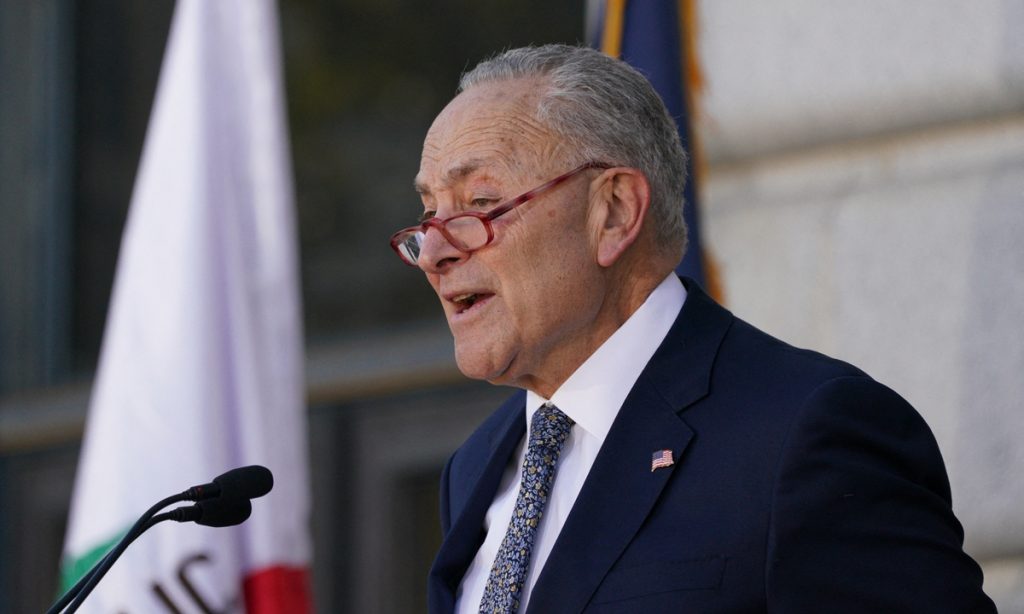Sincerity, not verbal hammer, needed in US senators’ visit

A delegation of six US senators arrived in Shanghai on Saturday, beginning a visit to China. The trip comes at an important time in the still unsettled bilateral relationship between China and the US.
The delegation is led by the Senate's majority leader, Chuck Schumer, and includes a mix of Democratic and Republican senators from Georgia, Idaho, Louisiana, New Hampshire and New York. After their initial stop in China, the five men and one woman will head to Japan and South Korea, both of which are viewed as reliable American allies.
American politics is fractured; the speaker of the House, Kevin McCarthy was recently ousted because he could not rein in his Republican colleagues and the Democrats saw no reason to support him. McCarthy's dismissal was an embarrassment to himself. But it also showed just how volatile US domestic politics is. Compromise, an essential feature of democracies, is hard to find in Washington, and political positions have also hardened within the American electorate. The 2024 presidential election will likely solidify these opinions even further.
Another aspect that might harden next year is hostility toward China within official Washington.
That would be unfortunate, but right now blasting China is a convenient way for political elites to cover up their differences. Sadly, the only thing elite politicians seem to agree on these days is their belief that China is a bad actor on the global stage. If you're looking for anyone in Washington to say something positive about the hugely influential Belt and Road Initiative, good luck. It's more likely to find someone who believes in the possibility of zombies ruling the world.
On top of attacking China for its global interests, politicians try to amplify any negative economic news as evidence that the country is doomed. They conveniently overlook the fact that China's economic growth will continue to outpace that of the US for the rest of the year and beyond. The global economic situation would be in bad shape if China were to have growth forecasts anywhere close to what the US is likely to experience.
The domestic US political response is not to proactively seek ways to make America stronger. Instead, politicians advance massive, but inadequate, policies that make vague promises about bolstering national security. One example is the CHIPS and Science Act which was passed by Congress despite critics pointing out numerous flaws associated with it. President Joe Biden contributes to this nonsense about China by refusing to erase the tariffs established by his predecessor even though the evidence continues to show the tariffs are doing more harm to the US than China.
The bottom line is that reality goes out the window whenever America's politicians talk about China.
Is it possible that the visit by Schumer and his colleagues could lead to some rational conversations regarding China within Congress? Will this visit build on the generally positive trips made over the past few months by the US secretaries of State, Treasury and Commerce? With each of those trips, there has been increased anticipation in the US that Presidents Biden and Xi Jinping will meet during the Asia-Pacific Economic Cooperation gathering, scheduled for next month in San Francisco. Optimists believe that successful conversations might open the door to a state visit.
If Schumer wants to positively advance US-China relations, then he should consider taking back a recent statement indicating that he will carry a verbal hammer into any conversations with Chinese officials.
Schumer is from New York, a state that according to one estimate sustains almost 50,000 jobs per year because of trade with China. It's also reported that New York exported more than $37 billion to China between 2012 and 2022. My point: Imagine if the Democratic senator had spoken in advance of his trip about finding ways to expand trade between New York (and other states) with China as part of his visit. That would be leadership, something too often hard to find in Washington.
Keep in mind something that ought to be favorably viewed by China: Schumer and his fellow senators are not making a side trip to Taiwan; such visits by American officials derail any momentum in improving relations because of Beijing's insistence that US politicians are seeking to stoke discord between the island and the mainland by stopping in Taiwan.
China will not, and should not, sit by quietly if Schumer follows through on his promise to talk tough with Chinese officials and to make an issue of human rights as well as Fentanyl. In 2023, China and the global community are all too aware that "you must do what we want" screeds from a prominent American politician do nothing to improve the bilateral relationship. More importantly, the US is no longer positioned to dictate to any nation, especially powerful ones, about how to conduct their internal and external affairs.
The author is an associate professor at the Department of Communication and Organizational Leadership at Robert Morris University.